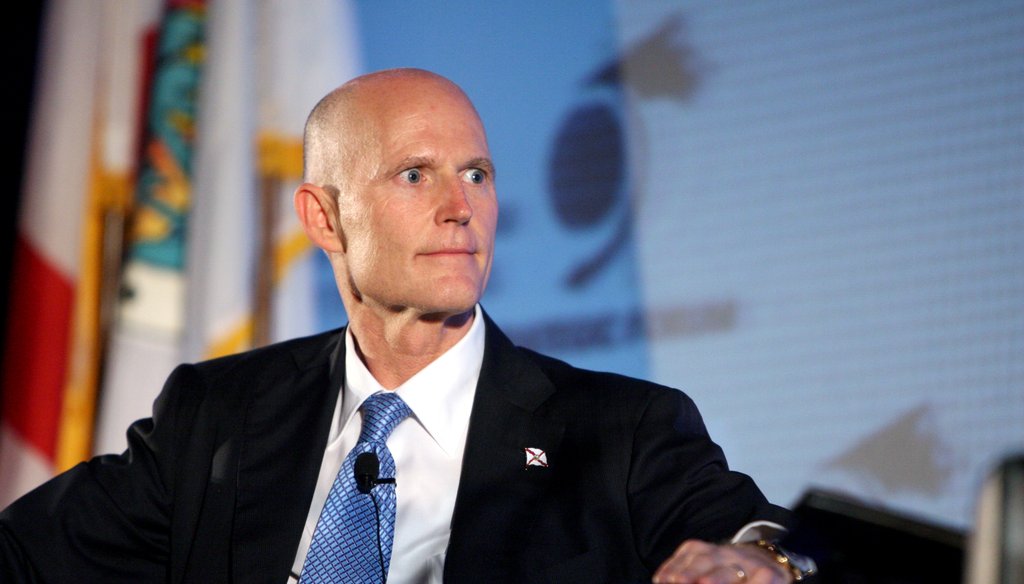Get PolitiFact in your inbox.

Florida Gov. Rick Scott has had ups and downs in his first 100 days.
Thursday, April 14, 2011, is Florida Gov. Rick Scott's 100th day in office, a symbolic marker in an elected executive's first term.
The date is of no official significance -- the idea of a "first 100 days" started with President Franklin D. Roosevelt -- but it is often used as a gauge for officials to try to move their agenda, and as an opportunity for others to look back and reflect.
Scott, a 58-year-old former hospital executive, campaigned on an aggressive anti-tax, anti-regulation, job-creation agenda, and he asked voters to hold him to his promises.
At PolitiFact Florida, we've been doing just that.
Since the start of his term, we have been tracking 59 of Scott's most prominent campaign promises on our Scott-O-Meter -- everything from cuts in the corporate income tax rate to changing the way expert testimony is allowed into the Florida court system. So far, we've rated five promises as "Kept," two as "Compromise" and one as "Broken." More on that one in a minute.
Our up-to-the-minute scorecard is a work in progress, and we have 22 promises listed as "In the Works" with final action still to come. In some ways, it's like checking a football score in the first quarter. So it's hard, in fact unwise, to make too many sweeping judgments. Because much can change.
But what is obvious, even at this early stage, is that Scott is attempting to push huge pieces of his agenda through the Legislature.
And the Legislature -- sometimes politely, sometimes not -- is pushing back.
"Gov. Scott is very smart, and people who are smart tend to think that processes are logical," House Speaker Dean Cannon told the St. Petersburg Times. "And Tallahassee is illogical. So adapting to that, I think, has been challenging."
To date, the hottest debate has been over a centerpiece of Scott's agenda -- tax cuts. Scott proposed in the campaign, and as part of his budget, reducing and eventually eliminating the state's 5.5 percent corporate income tax as well as lowering property taxes required to be levied by the state to pay for K-12 education.
But the budgets passed by the Senate and the House include no such cuts.
Legislative leaders say there isn't enough money. Scott has said they should find it. (For the record, Scott's proposed cuts to the school property tax didn't even go as far as he originally promised, rating as his lone Promise Broken).
"I hope they do the right thing. I hope they understand that we’re competing for jobs ... I hope everybody understands the importance of it," Scott said. "And it’ll be a big mistake if they don’t do it."
Another plank in Scott's proposal -- to eliminate pensions for state workers and replace them with 401(k)-style plans, and to make workers direct 5 percent of their income to help pay for those plans -- also has been pruned.
A House version of the reform would make all workers contribute 3 percent of their income and leaves the traditional pension program in place. The Senate plan is tiered, with higher-earning state employees contributiong more than lower ones. Under the Senate plan, most state workers (who make $40,000 or less) would pay $900 a year or less. Those who make $25,000 would pay $500 a year to their retirement fund.
Scott believes those plans "don't go far enough."
In the meantime, Scott has been able to celebrate small victories.
He was able to sell off the two state aircraft, even though Senate budget chief J.D. Alexander, R-Lake Wales, said the sale broke Florida law. And, as he promised, he is not taking the six-figure salary for the governor.
His biggest legislative achievement is the passage of SB 736, an education overhaul bill that requires new teachers to receive no more than one-year contracts and ties new teacher pay raises, in part, to the performance of their students on exams. The bill is an offshoot of SB 6, a measure that passed the Legislature last year but was vetoed by then-Gov. Charlie Crist.
It was the first piece of legislation Scott signed.
Scott's biggest promise, of course, is his seminal pledge to create 700,000 additional private-sector jobs over the next seven years. We can't measure that in 100 days (or even get much of a sense how he's doing). We can tell you, despite a claim from the group PinkSlipRick.com, that Scott has not lost 331,247 jobs since taking office.
On that promise, and many others, it'll take far longer than 100 days to see how Scott fares. And because of that, the Scott-O-Meter is just getting going.
Our Sources
See individual items.






























